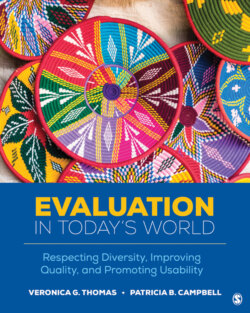Читать книгу Evaluation in Today’s World - Veronica G. Thomas - Страница 18
На сайте Литреса книга снята с продажи.
Evaluation Characteristics
ОглавлениеEvaluation is not simply a scientific endeavor in search of “truth” and “solutions.” Evaluation, while complex, is often less concerned with general truths and generalizations because it focuses on specific programs and practices taking place within a specific context. This makes evaluation much more an idiosyncratic activity that must be tailored to the particular circumstances under consideration. “Evaluation is not an examination into the inert, static, and external realities of programs but instead, into the fluid subjective world of people’s lives as experienced, interpreted, recalled, and mediated by them and the, oftentimes, racialized contexts of the systems that programs, communities, and individuals are embedded” (Thomas et al., 2018, p. 156). The complexity of social programs makes it critical that anyone who is tasked with evaluating such programs understand the context of the program and the evaluation. Chapter 9 covers this aspect in greater detail.
Evaluation is very much a social enterprise that is best understood by taking into consideration the social, cultural, economic, and political contexts surrounding the program under consideration. Attention to public interest and public good is a critical aspect of the evaluation process. Evaluators cannot ignore the reality that they become a part of the never-ending struggle to make judgment calls about social activities that create the conditions or obstacles for social mobility (Waters, 1998). In 1980, Cronbach et al. pointed out that program evaluation was a process by which society learns about itself. Melvin Hall (2018a) used that point to underscore the need for evaluators to take up more space in the public sphere where institutionalized sources of potential racism and classism should be identified and interrogated. His call was for evaluative thinking, as discussed in the next section, to become more prominent in public debate and policy reviews—an appeal to evaluators to identify and engage the important societal issues embedded in the work we do. Hall’s charge is an integral part of the underlying thinking of this book. The social justice focus of this book is not just limited to race and class but includes other social justice issues such as disability, sex or gender, sexual orientation, and socioeconomic status. In the activity that follows, readers begin to develop their own definitions of evaluation.
